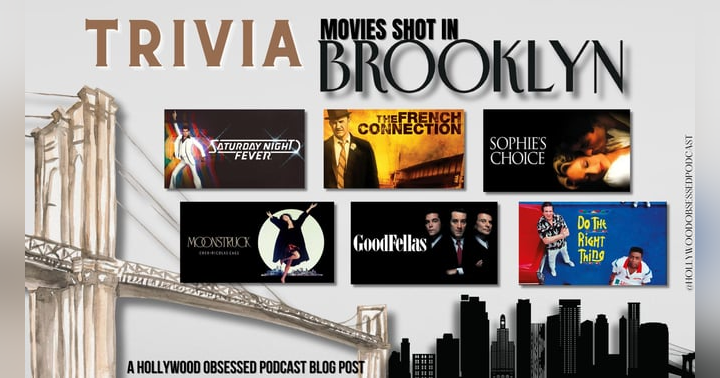In honor of my latest interview with L.A.’s premiere acting coach and film director Michelle Danner (Episodes 81 & 82), I have put together this fascinating trivia list featuring some fun facts about the history of women directors in Hollywood! Enjoy!
The first female movie director, Frenchwoman Alice Guy-Blaché, became one of the first individuals to make films on a regular basis. She is is credited as the first female director - the only one woman from 1896 – 1906. She directed her last film, ”Tarnished Reputations,” in 1920.
Produced by French company Gaumont, the film, “The Cabbage Fairy”, was directed by Alice Guy-Blaché, who would later become the first woman to build and operate her own studio. She would open Solax Studios in Fort Lee, New Jersey, the hub of filmmaking in America in its early years.
Mabel Normand was another significant early female filmmaker. She started as an actress and became a producer-writer-director in the 1910s, working on the first shorts Charlie Chaplin did as The Tramp at Mack Sennett's Keystone Studios.
The most profitable movie released by Universal Pictures in 1916 was a film on birth control and abortion, written and directed by that studio’s highest-paid director, Lois Weber.
During the the silent film era Lois Weber was the first woman to write, direct, produce and star in a movie (seven decades before Barbra Streisand), Weber addressed moral and women’s issues of the day including birth control, racial concerns and capital punishment.
At a time when very few women were directing, Dorothy Arzner was able to achieve success as a female director between the late 1920s and the early 1940s. She gave Golden Age female stars like Katharine Hepburn and Rosalind Russell intelligent, complex roles.
First woman to direct a film noir, Ida Lupino, is widely regarded as the most prominent female filmmaker working in the 1950s during the Hollywood studio system. She is best known for directing “The Hitch-Hiker”. Ida Lupino is also famous for her work as an actress.
Ida Lupino became the second female member to join the Director’s Guild of America, after Dorothy Arzner.
Appearing in the 1950s & 1960s, French New Wave became popular thanks to filmmaking pioneer Agnès Varda. Unsurprisingly, Varda didn’t achieve as much success as her fellow male filmmakers and was erased from history books.
At the time of her death, Agnès Varda was the oldest person to be nominated for an Academy Honorary Award. She received it on 11 November 2017 for her contributions to cinema, making her the first female director to receive such an award. The prize was presented to her by Angelina Jolie at the 9th Annual Governors Awards ceremony. She was nominated two months later for the Academy Award for Best Documentary Feature for her documentary Faces Places, becoming the oldest nominated person at the show (she was 89 yeas old - eight days older than fellow nominee James Ivory).
In 1977 an Italian-born filmmaker of Swiss descent, Lina Wertmüller was the first female director nominated for the Academy Award for Best Director for the art house film “Seven Beauties”. The film received three other Academy Award nominations, including one for Best Foreign Language Film. It also received a Golden Globe Award nomination for Best Foreign Film.
Lina Wertmüller received an Academy Honorary Award for her career in 2020.
Barbara Streisand’s 1984 musical drama “Yentl” earned her a Golden Globe for Best Director, which made her the first woman to receive the honor. She stood alone for 37 years until Chloé Zhao joined her with a win for “Nomadland.”
Penny Marshall became the first woman to direct a movie that grossed over $100 million with “Big” in 1988. She went on to repeat the feat with “A League of Their Own,” which was inducted into the Library of Congress’ National Film Registry.
When it comes to influential films directed by women, Cheryl Dunye's often-overlooked “The Watermelon Woman” (1996) is a landmark for its impact on LGBTQ+ and black cinema.
In 2000, the satirical horror film “American Psycho” starring Christian Bale was directed by Mary Harron, who co-wrote the screenplay with Guinevere Turner. The screenplay was based on the 1991 novel of the same name by Bret Easton Ellis. The film received mostly positive reviews, with praise for Bale's performance and the screenplay, and grossed over $34 million on a $7 million budget.
Nancy Meyers has enjoyed success with her five features: “The Parent Trap” (1998), “What Women Want” (2000), “Something's Gotta Give” (2003), “The Holiday” (2006) and “It's Complicated” (2009) which have amassed $1,157 million worldwide.
Sophia Coppola, daughter of director Francis Ford Coppola, became the third woman to be nominated for the Best Director Oscar in 2004, for “Lost in Translation”. As it was with the previous two nominees for Best Director, she also was nominated for Best Original Screenplay. In that category, Coppola took the Oscar home.
Kathryn Bigelow became the fourth woman nominated and the first woman to win the Best Director Oscar for “The Hurt Locker” in 2010. That night she also took home a shared Oscar for Best Picture for the same film.
In 2014, Ava DuVernay directed “Selma”, a $20 million budget dramatic film about Martin Luther King Jr , President Lyndon B Johnson and the 1965 Selma to Montgomery march for voting rights. The film was nominated for Best Picture and Best Original Song, but not Best Director, at the 2014 Academy Awards. The lack of diversity among the Oscar nominations for 2014 was the subject of much press.
In 2017, DuVernay became the first Black woman nominated for an Academy Award for Best Documentary Feature, for her film "13th".
Greta Gerwig became the fifth woman nominated for the Best Director Oscar in 2018 for “Lady Bird". Like three of the four preceding female nominees, she, too, was nominated for Best Original Screenplay for her film.
Patty Jenkins directed the "Wonder Woman" (2017) blockbuster, which became the highest-grossing superhero origin film in history. The blockbuster grossed over $800 million at the worldwide box office!
In 2020 Chloé Zhao becoma the third woman to ever win an Academy Award for Best Picture and Best Director, becoming the second woman and first woman of color to win the latter, for “Nomadland.” She also won awards for directing at the Directors Guild of America Awards, Golden Globe Awards, and British Academy Film Awards, becoming the second female winner of each of them
Jane Campion’s “The Piano” earned her her first Academy Award for Best Adapted Screenplay in 1994, but it also made her the first woman to capture the most prestigious award in international cinema: the Palme d’Or. She is also the first female filmmaker to be nominated for the Academy Award for Best Director twice (she finally won in 2022 for “The Power of the Dog”).
Only seven women have ever been nominated for an Academy Award for Best Director - Lina Wertmüller, Jane Campion, Sofia Coppola, Kathryn Bigelow, Greta Gerwig, Chloé Zhao, and Emerald Fennell.
Kathryn Bigelow, Chloé Zhao, and Jane Campion are the only women to ever win the Academy Award for Best Director.
The overwhelming success of “Barbie” — Greta Gerwig’s behemoth blockbuster - gave Gerwig the distinct honor of being the first woman to direct a movie that grossed $1 billion on her own.
Trivia items from IMDB & Wikipedia
To listen to my illuminating conversation with Hollywood film and stage director Michelle Danner (Episodes 81 & 82) who has directed several independent films like “How To Go Out On A Date In Queens” starring Jason Alexander, “Hello Herman” starring Norman Reedus, and “Miranda’s Victim” starring Donald Sutherland on my podcast, click the links below. Enjoy!
Episode 81 - HERE
Episode 82 - HERE












